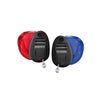 Listening Lab Malaysia has a selection of Signia hearing aids. Check it out!
Listening Lab Malaysia has a selection of Signia hearing aids. Check it out!

Just like other technological devices, hearing aids use batteries too. Not just any type of batteries, but standard disposable batteries – zinc-air button batteries. These are commonly used in hearing aids and other battery-powered devices like toys, watches, remote controls, and even musical greeting cards.
When choosing a hearing aid, not only do you have to consider the functions of different designs, it is a good consideration to think through which battery type works best for you.
Here are 5 good facts about hearing aid batteries to equip yourself with enough knowledge to decide which battery suits you best.
Activation
The hearing aid batteries come packaged with a factory-sealed sticker on them, allowing them to remain inactive until the sticker is removed as these batteries are air-activated. To get the best performance from the battery, let the battery sit for 2-3 minutes before installing it in your hearing aid. This way, it allows the air to reach the components inside the battery and activate them.
Once you remove the factory-sealed sticker, replacing the sticker back will not deactivate the battery. Only remove the sticker when you need the battery. Hence, once the sticker is removed, the battery will remain in an active state until the power is drained and you have to replace it again.
Expiration
Like other perishable products, hearing aid batteries have an expiration date. If you are concerned about that, take a look at the packaging. They, like other products, have an expiration date on the packaging. Generally, hearing aid batteries have a three-year shelf life. The three years include the time when they were produced so when you purchase the batteries, always be on a lookout for the batteries with a date the furthest out.
Storage
The ideal place to store hearing aid batteries is in a dry location at room temperature. They should be kept in their original package or a special battery organizer to avoid the short circuit of the batteries if they are in vicinity of metal objects like coins and nails. The short circuit will reduce the original lifespan of the batteries.
Do not store your hearing aid batteries in reach of children or pets. They can often be mistaken as sweets or snacks because of their size and if swallowed or inhaled, they can cause serious injuries.
Handling
There are mandatory steps you must take to maximize the lifespan of your batteries and get the best performance out of them.
- Wash your hands thoroughly before changing out the batteries as dirt and debris transferred from your hands to the batteries may clog up the air pores in the battery that might hinder the activation process.
- Use a hearing aid dehumidifier as it will help suck out the moisture out of your hearing aid and battery. This helps with the efficiency of the battery power and as well as a storage place for your hearing aids.
- Remove the batteries if you are not using the hearing aid for an extended period of time to avoid corrosion from battery leakage and damage from trapped moisture.
- Keep the factory-sealed stickers on the batteries to maintain the freshness of the battery.
Freshness
Leave the factory-sealed sticker on the battery if you are not using it. This will keep the battery in a dormant state and no power will be lost during storage. But even with the sticker on, these batteries will still slowly lose charge over time. Only less than 10% per year as compared to batteries whose stickers have already been removed. Always check the expiration date on the packaging of the batteries before purchase.
Downtime
This depends on your hearing aid model and your playtime. Your batteries will need to be changed every three to ten days but do not worry, most hearing aids will give you a signal when it is about to run out of battery. They will usually produce a tiny beep sound to alert you that the battery is going to die.
If you dislike the waste and hassle of these disposable batteries, rechargeable hearing aids are a great investment. You get to save more on battery purchases and maintenance of rechargeable batteries is low as they only need to be replaced on a yearly basis. Check out our rechargeable hearing aids range, our Signia and ReSound hearing aids that can be recharged quickly, completely fuss-free, like a mobile phone.











